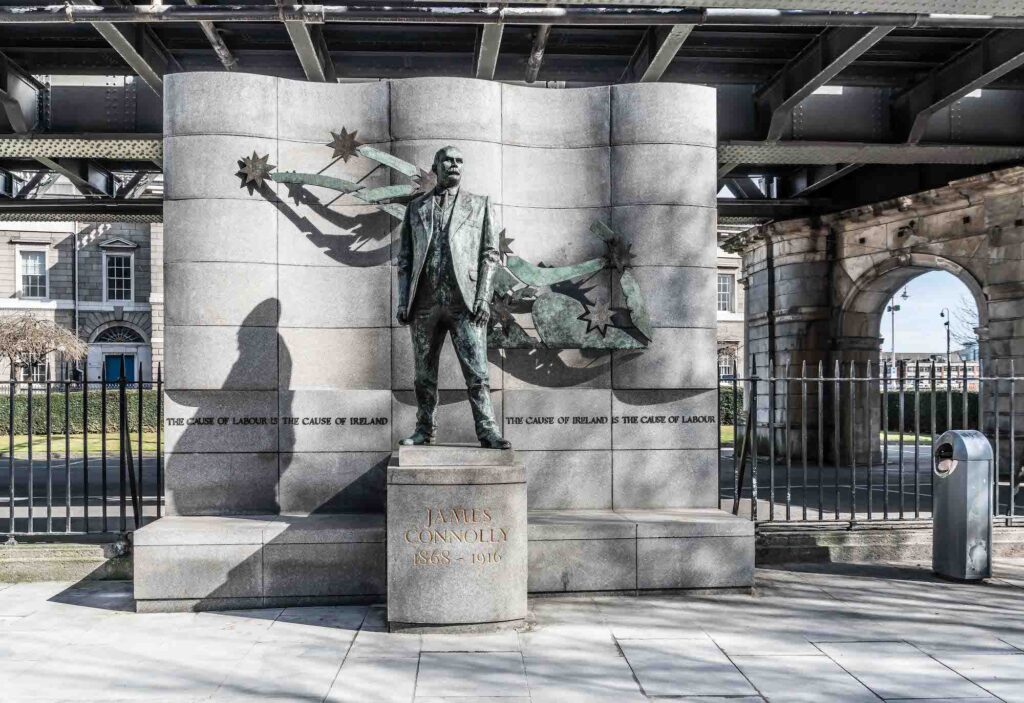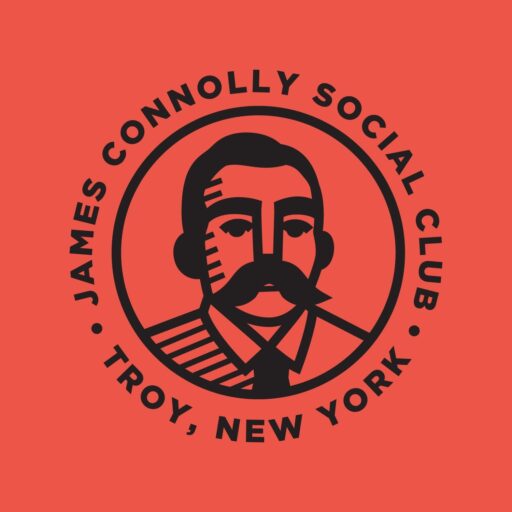
A one-time resident of Troy, James Connolly dedicated his life to creating a more just world for the poor and working class. He was a prolific writer, tireless organizer and self-taught intellectual.
Connolly was born June 5, 1868 to a family of poor Irish immigrants in a slum of Edinburgh, Scotland. He left school at the age of 11 to work and help support his family. Lying about his age, he enlisted in the British Army at 14. Disgusted and unwilling to be assigned to a colonial regiment bound for India, he deserted at age 21 and became active in Scottish and Irish socialist politics.
A gifted orator, in 1902 Connolly travelled to the United States on a speaking tour for the Irish Socialist Republican Party (ISRP). He spent most of the next decade in the U.S., living with extended family in Troy, NY from 1903 to 1905. While in Troy, Connolly lectured, organized and worked selling insurance door-to-door to make ends meet. In 1905, he threw his support behind the Collar Starchers Union strike, raising money and political support for the striking women.
Connolly left Troy in 1905 and became a founding member of, and organizer for, the Industrial Workers of the World (IWW), working closely with the likes of Big Bill Haywood, Elizabeth Gurley Flynn, and Mother Jones. Remarkably, he taught himself to speak fluent Italian as well as some German, French and Yiddish in order to more effectively communicate with immigrant communities, all while working side-jobs including an extended stint as a machinist at the Singer Factory in Elizabeth, NJ.
Returning to Ireland in 1910, Connolly was active with the Irish Transport & General Workers Union (ITGWU), helped found the Irish Citizens Army (ICA), and would famously lead the Easter Rebellion of 1916 for which he was sentenced to death by the British Government on May 12, 1916.
Connolly is rightly celebrated as a giant in the struggle for Irish Independence. His genius, however, arguably lies in his framing of that struggle through the intersectional lens of republican socialism, feminism, anti-imperialism and democratic worker control.
REPUBLICAN SOCIALISM
James Connolly was clear, “the day has passed for patching up the capitalist system, it must go.”[i] For Connolly, achieving Irish independence without broader economic change was not sufficient. Rather, he famously wrote:
“If you remove the English army tomorrow and hoist the green flag over Dublin Castle, unless you set about the organisation of the Socialist Republic your efforts would be in vain. England would still rule you. She would rule you through her capitalists, landlords and financiers.”[ii]
FEMINISM
An early and unapologetic feminist, Connolly advocated women’s suffrage, championed women’s labor movements and saw women’s liberation as inseparable from the struggle for Irish independence. He argued “[o]f what use to such sufferers can be the reestablishment of any form of Irish state if it does not embody the emancipation of womanhood.”[iii] Adding, in his defense of women’s political and economic equality, that: “[n]one so fitted to break their chains as those who wear them, none so well equipped to decide what is a fetter.”[iv] The Easter Proclamation, issued at the beginning of the 1916 Rebellion and signed by James Connolly, evinced these principles and advocated the extension of equal rights and universal suffrage to all Irishmen and Irishwomen.
ANTI-IMPERIALISM
James Connolly was unequivocal in his denunciation of colonialism and imperialism. Writing about British imperialism in 1915, he stated that it:
“…stifles the ancient culture of India, strangles in its birth the new-born liberty of Egypt, smothers in the blood of ten thousand women and children the republics of South Africa, betrays into the hands of Russian despotism the trusting nationalists of Persia, connives at the partition of China, and plans the partition of Ireland. North, south, east and west it has set its foot upon the neck of peoples, plundering and murdering, and mocking as it outraged. In the name of a superior civilization it has crushed the development of native genius, and in the name of superior capitalist development it has destroyed the native industries of a sixth of the human race.”[v]
Connolly was also frank in acknowledging the complicity of Irish people in British imperialism. He noted, with irony, the Irish willingness to oppress others but not face their own oppressor, writing: “In Africa, India or America, wherever blood is to be spilt, there you will find Irishmen, eager and anxious for a fight, under any flag, in anybody’s quarrel, in any cause – except their own.”[vi]
DEMOCRATIC WORKER CONTROL
James Connolly was clear that he did not want to simply recreate state power under Irish control, for: “[w]ithout the power of the industrial union behind it, democracy can only enter the state as the victim enters the gullet of the serpent.”[vii] Rather, Connolly sought:
“…the application of republican and democratic principles to the industrial and social life of the community, therefore resolutely determined to apply those principles to public life at every step towards the ideal.”[viii]
CONCLUSION
James Connolly left behind a powerful and prescient legacy synthesizing these principles of republican socialism, feminism, anti-imperialism and democratic worker control. He did so in his writings, his speeches and, most importantly, in his actions. It is for these reasons, and for his connection to Troy, that we are proud to name our club after James Connolly and organize in pursuit of the ideals he embodied.
** “Our great object will be to unite the workers and to bury, in one common
grave, the religious hatreds, the provincial jealousies and mutual distrusts
upon which oppression has so long depended for security.”[ix] **
[i] Labor, Religion and Nationality, Chapter 6 (1910).
[ii] Socialism and Nationalism (1897).
[iii] The Re-Conquest of Ireland: Woman, Chapter 7 (1915).
[iv] Ibid.
[v] In Praise of Empire (1915)
[vi] The Fighting Race (1898)
[vii] The Re-Conquest of Ireland: A Summing Up, Chapter 9 (1915).
[viii] A Socialist Candidate for Dublin Corporation (1898).
[ix] The Fight Race (1898)
